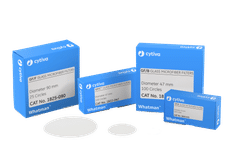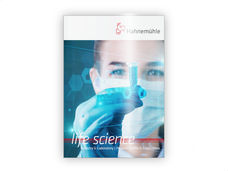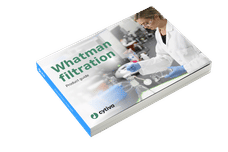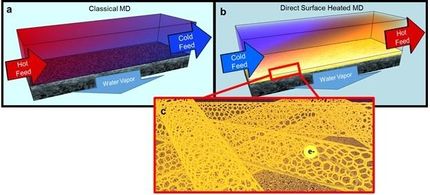New lithium collection method could boost global supply
With continual technological advancements in mobile devices and electric cars, the global demand for lithium has quickly outpaced the rate at which it can be mined or recycled, but a University of Texas at Austin professor and his research team may have a solution.
Benny Freeman, professor in the McKetta Department of Chemical Engineering in the Cockrell School of Engineering, and his colleagues at the Monash University Department of Chemical Engineering and the Commonwealth Scientific and Industrial Research Organisation (CSIRO) in Australia have recently discovered a new, efficient way to extract lithium and other metals and minerals from water.
The team's technique uses a metal-organic-framework membrane that mimics the filtering function, or "ion selectivity," of biological cell membranes. The membrane process easily and efficiently separates metal ions, opening the door to revolutionary technologies in the water and mining industries and potential economic growth opportunities in Texas.
The Barnett and Eagle Ford shale formations in Texas contain high amounts lithium, and the produced wastewater generated by hydraulic fracturing in those areas has high concentrations of lithium. Instead of discarding the produced water, the team's membrane filter could extract the resulting lithium and put it to use in other industries.
"Produced water from shale gas fields in Texas is rich in lithium. Advanced separation materials concepts such as ours could potentially turn this waste stream into a resource recovery opportunity," Freeman said.
Each well in the Barnett and Eagle Ford can generate up to 300,000 gallons of produced water per week. Using their new process, Freeman and his team conservatively estimate that from just one week's worth of produced water, enough lithium can be recovered to power 200 electric cars or 1.6 million smartphones.
In addition, the team's process could help with water desalination. Unlike the existing reverse-osmosis membranes responsible for more than half of the world's current water desalination capacity, the new membrane process dehydrates ions as they pass through the membrane channels and removes only select ions, rather than indiscriminately removing all ions. The result is a process that costs less and consumes less energy than conventional methods.
The team's material operates on principles inspired by highly effective biological cell membranes, whose mechanism of operation was discovered by Roderick MacKinnon and Peter Agre and was the subject of the 2003 Nobel Prize in chemistry.
"The prospect of using metal-organic frameworks for sustainable water filtration is incredibly exciting from a public-good perspective, while delivering a better way of extracting lithium ions to meet global demand could create new industries," said Anita Hill, CSIRO's chief scientist.
Original publication
Zhang, Huacheng and Hou, Jue and Hu, Yaoxin and Wang, Peiyao and Ou, Ranwen and Jiang, Lei and Liu, Jefferson Zhe and Freeman, Benny D. and Hill, Anita J. and Wang, Huanting; "Ultrafast selective transport of alkali metal ions in metal organic frameworks with subnanometer pores"; Science Advances; 2018
Most read news
Original publication
Zhang, Huacheng and Hou, Jue and Hu, Yaoxin and Wang, Peiyao and Ou, Ranwen and Jiang, Lei and Liu, Jefferson Zhe and Freeman, Benny D. and Hill, Anita J. and Wang, Huanting; "Ultrafast selective transport of alkali metal ions in metal organic frameworks with subnanometer pores"; Science Advances; 2018
Topics
Organizations
Other news from the department science
These products might interest you

Glass and quartz microfiber filter by Cytiva
Request a glass microfiber sample pack to meet your battery development needs
Delivering efficient and consistent results

Hahnemühle LifeScience Catalogue Industry & Laboratory by Hahnemühle
Wide variety of Filter Papers for all Laboratory and Industrial Applications
Filtration Solutions in the Life Sciences, Chemical and Pharmaceutical Sectors

Whatman filtration product guide by Cytiva
New filtration catalog - a wealth of information on 286 pages
Discover the perfect filters for your laboratory application

Get the chemical industry in your inbox
By submitting this form you agree that LUMITOS AG will send you the newsletter(s) selected above by email. Your data will not be passed on to third parties. Your data will be stored and processed in accordance with our data protection regulations. LUMITOS may contact you by email for the purpose of advertising or market and opinion surveys. You can revoke your consent at any time without giving reasons to LUMITOS AG, Ernst-Augustin-Str. 2, 12489 Berlin, Germany or by e-mail at revoke@lumitos.com with effect for the future. In addition, each email contains a link to unsubscribe from the corresponding newsletter.

























































